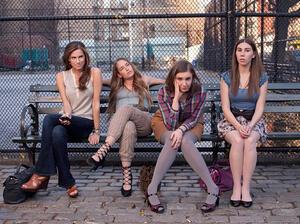Make way for "Girls"
I was really wary of watcing HBO's new female-driven comedy, "Girls." I'd heard a lot of not-great reviews and was afraid it would read like an emo version of "Sex and the City," which I was never fan of to begin with. I don't typically fall for awkward comedies a la "Arrested Development," either, as they tend to make me, well, uncomfortable - perhaps because my life often feels like an awkward comedy, and I like for my TV shows to hit a bit less close to home. Still, I was drawn to "Girls" because Lena Dunham, its writer, creator, and star, is just 25 years old - and, oh, she's also Jewish. It's also produced by funnyman Judd Apatow (also Jewish), who has turned out such comedic greats as "Anchorman," "Bridesmaids," and "Superbad." With a behind-the-scenes cast like that, I knew I had to give "Girls" a try.
I was right. "Girls" did, indeed, feel like a sort of sad, emo "Sex and the City" - if you concede that the only thing it has in common with the indulgent, iconic series that made Sarah Jessica Parker famous is that it focuses on four young women who live in New York. For all intents and purposes, this new women are entirely different from their SATC predecessors. They are not fashionistas; they don't appear to be wildly successful in their careers or in love; they are not wealthy (the premiere opens with main character Hannah's parents cutting off her financial support), and in some cases, they're not even friends (Hannah's two best friends, Marnie and Jessa, live together but don't like one another much, as discussed in a conversation-slash-argument held in the bathroom while Jessa does her, um, business). When you get down to it, comparing "Girls" to "Sex and the City" is sort of like comparing "Mad Men" to "The Office" just because they're both set in the workplace.
After watching the pilot, I found myself watching snippets of an interview with "Girls" creator Dunham, who is also the star of the show. Main character Hannah is possibly brilliant but also unquestionably bumbling, a strong-willed feminist, in theory, who often wilts in the face of challenge - for, example, she accidentally quits her internship in the pilot episode while trying to request that she be made a paid staffer. Of her character, Dunham says,"[Hannah] has that kind of interesting mix of complete self-confidence and no self-worth that sort of, like, is the trademark of most 24-year-old girls and most Jewish comedians."
Did that sentence resonate with you? It did with me, to. Even before Dunham got to the bit about Jews, I was thinking "Hey! That's me!" I guess I am, in more than a few ways, a lot like Hannah, which is not exactly a good thing; save for her wit, Hannah is not a particularly enviable character. And yet: Convinced that I, too, could be "the voice of my generation" ("Or at least a voice. Of a generation.") if I actually applied myself, I, too, am a thoughtful but largely aimless post-collegiate feminist stumbling through my 20s. There are so many of us, aren't there? Even the most awkward aspects of Hannah's life resonated with me, from the friends-with-benefits relationship she stays in presumably for the (bad) sex to her not-all-that-cutthroat struggle to survive in a city too big and too expensive for her pocketbook.
So is this a female thing? A twentysomething thing? Even, as Dunham suggests, a Jewish thing? I'm inclined to say that while young women - and perhaps even young Jewish women, in particular - are more likely to identify with "this interesting mix of self-confidence and no self worth," it is in no way unique to any one demographic. These feelings are universally human, ones that nearly all of us have experienced at some time or another, manifested in a variety of situations and responses. Though "Girls'" pilot focuses primarily on Hannah, the other characters show promise, as well, offering relatability in multiple forms: Marnie is a neurotic perfectionist who's fallen out of love with her boyfriend, and Jessa is a cool, nonchalant Brit who's moved to New York to be closer to her friends in the face of an unexpected pregnancy. Their fourth roommate, Shoshana, has yet to display any personality beyond her rambling, airheaded comments about - wait for it - "Sex and the City," but I suppose there's still hope for her, too. It's early, after all!
I've read reviews of "Girls" that insist that its characters are too pigeonholed, too detailed, too quirky to be relevant to anyone beyond a specific subset of young women. To this I say, "And you thought I would relate to Carrie Bradshaw?!" Sure, "Girls" is a little bit too quirky (I've never consumed a cupcake in the bathtub or visited my parents while high on opium - though I'm sure someone has), but those quirks make for interesting characters who are undoubtedly more realistic than four wealthy women who wear Prada to the grocery store. The way I see it, "Girls" is relatable to me now in the way "Dawson's Creek" was relatable to me when I was 14 - which is to say that while I never climbed a ladder into my neighbor boy's bedroom or spoke in $10 words to my high school peers, the show effectively conveyed emotions and situations that were relevant to my life. The characters did a better job of expressing their fears and dreams and goals than I was capable of doing, and watching them struggle with feelings that mirrored mine helped me, in some small way, to identify and address my own issues.
"Girls" is just two episodes into its first season, and already, Dunham has come under fire for a number of reasons. Is this show funny enough? Is this show realistic enough? Is this show universal enough? I'd like to take this opportunity to remind everyone how bad the first season of "Sex and the City" was - and, for that matter, how great the first episode of "Glee" was. A pilot is our first impression, but rarely is it an accurate representation of the depth and diversity a show will take on throughout its run. I, for one, look forward to seeing how "Girls" progresses and to reading the no doubt countless analyses that will accompany it throughout its growth. For now, though, I'm thrilled to see a young Jewish woman like Lena Dunham taking front and center in the entertainment world, reminding us that "Saturday Night Live" is not the only breeding ground for funny ladies. If each of the next episodes of "Girls" features at least one scene as funny as the pilot's portrayal of a high Hannah stuck in her skirt on her parent's hotel room floor, it will have made a dedicated fan out me.








i find "girls" offensive. i was a girl in the early 70's. It was a free and experimental time. However, I had a healthy dose of self esteem and was not about to give myself away to any young man who was in a quest to satisfy his natural sexual urges so that I could feel accepted. Hello!! I find the series "girls" degrading to young women. Why do these young women need to satisfy men instead of grounding themselves? So pathetic. I think that girls today have been brainwashed by the media.